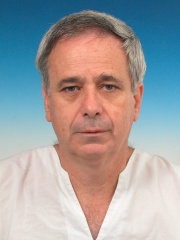
The Most Famous
POLITICAL SCIENTISTS from Israel
This page contains a list of the greatest Israeli Political Scientists. The pantheon dataset contains 46 Political Scientists, 1 of which were born in Israel. This makes Israel the birth place of the 12th most number of Political Scientists behind Ukraine, and Martinique.
Top 1
The following people are considered by Pantheon to be the most legendary Israeli Political Scientists of all time. This list of famous Israeli Political Scientists is sorted by HPI (Historical Popularity Index), a metric that aggregates information on a biography's online popularity.

1. Ilan Pappé (b. 1954)
With an HPI of 60.94, Ilan Pappé is the most famous Israeli Political Scientist. His biography has been translated into 26 different languages on wikipedia.
Ilan Pappé (Hebrew: אילן פפה [iˈlan paˈpe]; born 7 November 1954) is an Israeli historian and political scientist, known for his work on the Israeli–Palestinian conflict and as a leading figure among Israel's New Historians. He is a professor at the University of Exeter's College of Social Sciences and International Studies, where he directs the European Centre for Palestine Studies and co-directs the Exeter Centre for Ethno-Political Studies. Pappé's research focuses on the 1948 Palestinian expulsion and flight, which he characterizes as a deliberate ethnic cleansing campaign, citing Plan Dalet as a blueprint. His notable works include The Ethnic Cleansing of Palestine (2006), A History of Modern Palestine: One Land, Two Peoples (2003), and Ten Myths About Israel (2017). Born in Haifa, Israel, Pappé was a senior lecturer at the University of Haifa (1984–2007) and chaired the Emil Touma Institute for Palestinian and Israeli Studies (2000–2008). He left Israel in 2008 after facing criticism in the Knesset and receiving death threats. Pappé was active in Israeli politics as a member of the Hadash party and ran in the 1996 and 1999 elections. He advocates a single democratic state for Israelis and Palestinians and supports the BDS movement, including an academic boycott of Israel.
People
Pantheon has 1 people classified as Israeli political scientists born between 1954 and 1954. Of these 1, 1 (100.00%) of them are still alive today. The most famous living Israeli political scientists include Ilan Pappé.

